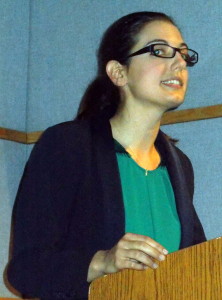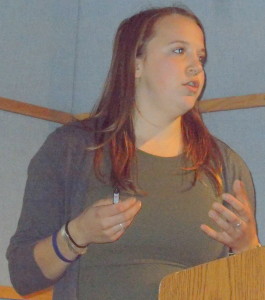Coffee Shop Conversation: URI Grad Students Present Findings at Science Café
Here’s the thing: you have five minutes to explain all you can about a project you’ve been working on for years. And you’re going to do it in front of a live audience. Ready? Go.
If this sounds like a panic attack-inducing dream, you may not have done so well at URI’s recent Science Café. Fortunately the baker’s dozen presenters, all post-graduate students, did not panic as they spent 90 minutes doing back-to-back summaries of their work in subjects as diverse as molecular biology, aquaculture, oceanography, and pharmacy, just to name a few. The goal was to encourage students to be able to articulate information in a concise format to a diverse audience. Dr. Richard Rhodes, III, Associate Dean of the College of Life Sciences, compared it to speed dating.
“We’re providing an opportunity for our grad students to share their science in a different forum. Most of them are accustomed to going to a meeting with their professors to discuss their work, with plenty of time involved. Here, you’ll see science based on the speed dating template. The goal is to present their elevator pitch scenario. The students need to be clear in their presentations: what’s the problem? What did you find? What’s the importance of that finding?” The research the students are doing will become contributions to the larger body of knowledge that drives decision making in areas such as climate change and world health.
Melissa Burger, for example, looked at a common invasive species of grass found all over Rhode Island called phragmite. Her research examined phragmite, often called swamp grass, as it appeared in 14 sites on both east and west coasts. Ultimately, examining the way these grasses respond to different environmental conditions at the different locations may allow scientists to better understand how invasives will react to climate change. “Why is this important? Can we predict how plant communities may reorganize (as the global climate changes)?” Burger’s hope is that this research may be a step in that direction.
Ryan Sullivan, from the Department of Civil and Environmental Engineering, examined a new water filtration process intended to provide people in third world countries with access to safe, sustainable water. He explained that in some parts of the world, the only access people have to safe water is through
boiling, which is a major process. Even then, storing water is a problem, as some people must rely on five-gallon buckets, increasing the likelihood that the boiled water eventually becomes contaminated. Sullivan’s work involved testing the use of a special ceramic filter that would allow an individual to pour untreated water into the top of a container fitted with a ceramic filter and have clean water come out in a matter of minutes. Sullivan said that the filters could one day be available in a household design as well as an individual one. Both types would have the additional benefit of eliminating the practice of leaving water standing in the buckets.
Claire Wilson, a student of Biological Environmental Sciences, began her talk with a photo of an Eastern Hemlock forest, a variety for which she said Robert Frost had great affection. Her work focused on two insects: the Elongate Hemlock Scale, and the Wooly Adelgid, insects that cause massive destruction in these forests.
“You can imagine walking through a forest path in the Smoky Mountains and encountering a lot of trees that are no longer alive (because of these insects). They’ve had to close a lot of paths because it’s just too dangerous to go hiking through the skeletal forests.” She and her lab spent years examining a stand of hemlock planted in 2011, and she noticed that there may be a difference in the way hemlocks react to the two insects, depending upon which one attacked the trees first. Information like this may one day lead to a way to increase the survival of Frost’s favorite trees.
Dr. Richard Rhodes spoke of the science café format’s origins. “The whole idea of a science café has cropped up recently in science. We as scientists are not doing a very good job of communicating the ‘whys’ of science to the general public. As a guy in science ed, I’m always shocked at what even good students don’t know about science.
“We as scientists must be able to communicate if we expect scientific literacy to become commonplace in the greater community.” Rhodes pointed to topics such as global warming, climate change, and genetically modified organisms as examples of the way science is being discussed in the media. “How will we as scientists develop that element of scientific literacy? If we expect our citizens to make good and reasonable decisions about the world in which we live, we’ve gotta do a good job as scientists communicating our science.”
Dr. Rhodes concluded the event with an anecdote that emphasized why the ability to communicate in a clear, concise manner can make the difference between getting funding for projects and losing. He had travelled to Washington, D.C. to meet with Senator Jack Reed to discuss a request for $1.1 million in funding. Rhodes had painstakingly constructed a 20-minute Power Point presentation intended for use in a meeting at Reed’s office. Upon Rhodes’s arrival at the office, he was told Reed could only meet with him in the Senate. He was quickly shuttled to the new location, thinking about the carefully selected slides that Reed would never see.
As he arrived at the Senate, Rhodes learned that Reed was in the midst of a vote. Rhodes knew that he had to make his 20-minute presentation good. When Reed and a group of his aides finally bustled over to Rhodes, he turned to the scientist and said, “I can give you one minute.” The stunned Rhodes gave Reed the pitch as quickly as he could. The results, Rhodes said, were a very good reason for forums like the Science Café to continue. “I got the $1.1 million.”
I’m a freelance writer, naturalist, and teacher living in Richmond, RI. Follow me on Facebook at www.facebook.com/scienceandnatureforapie .










